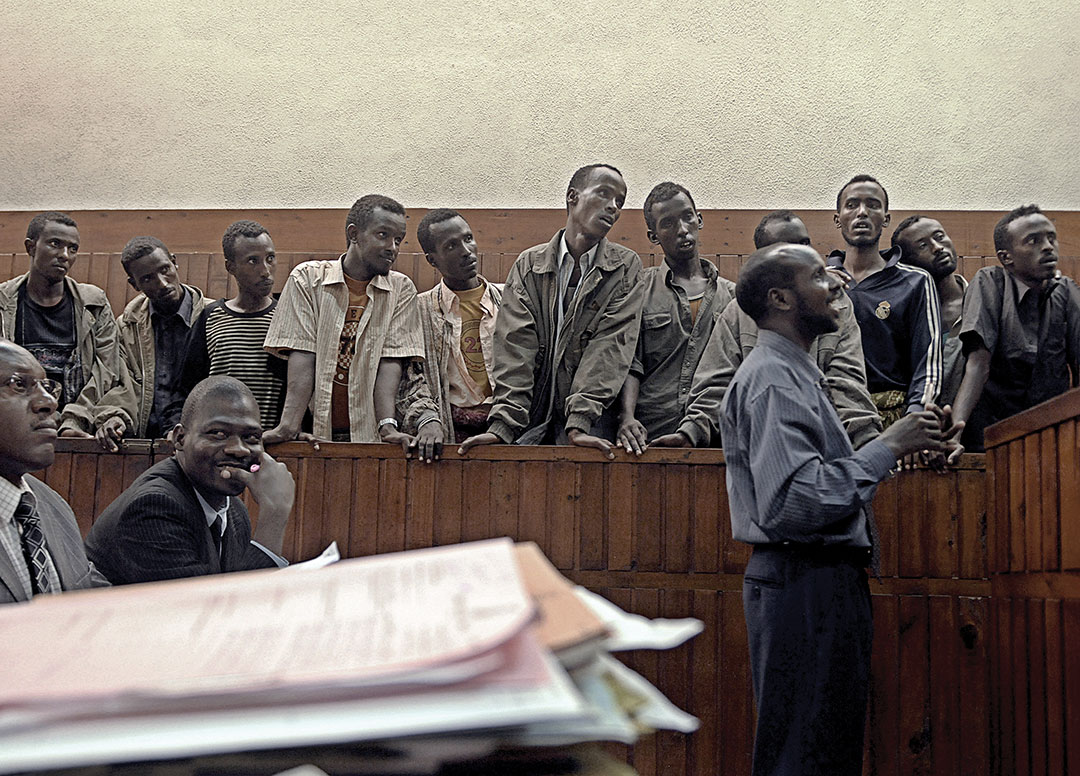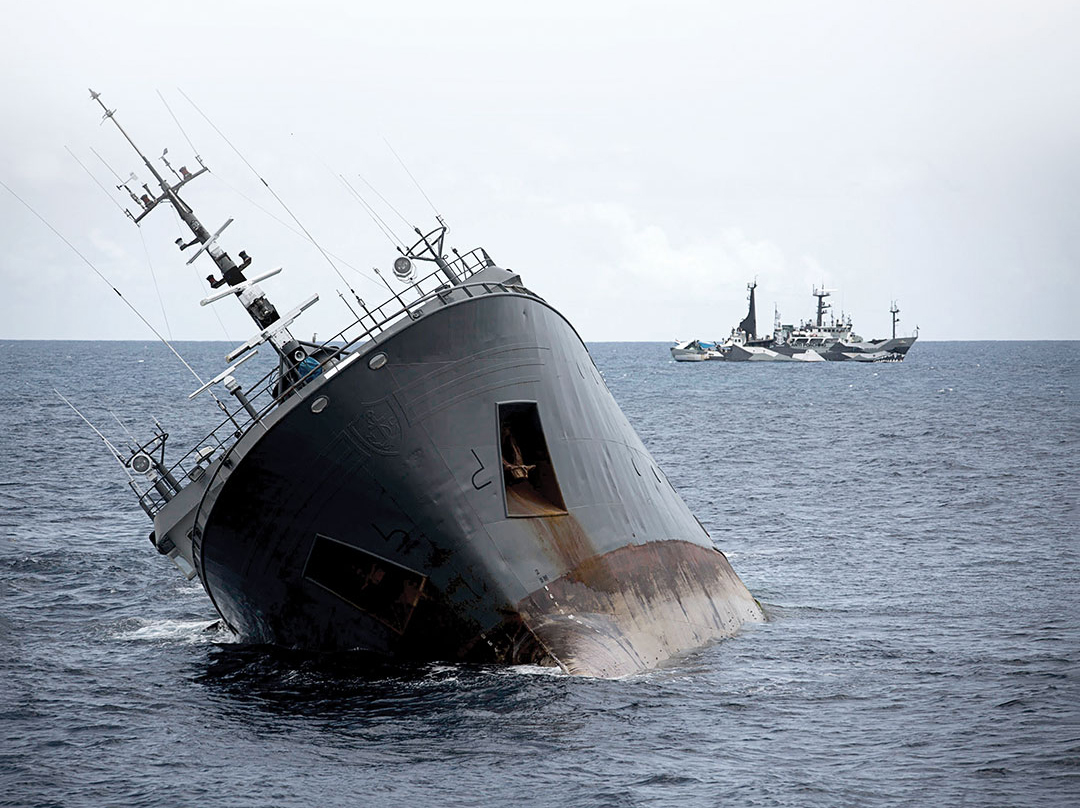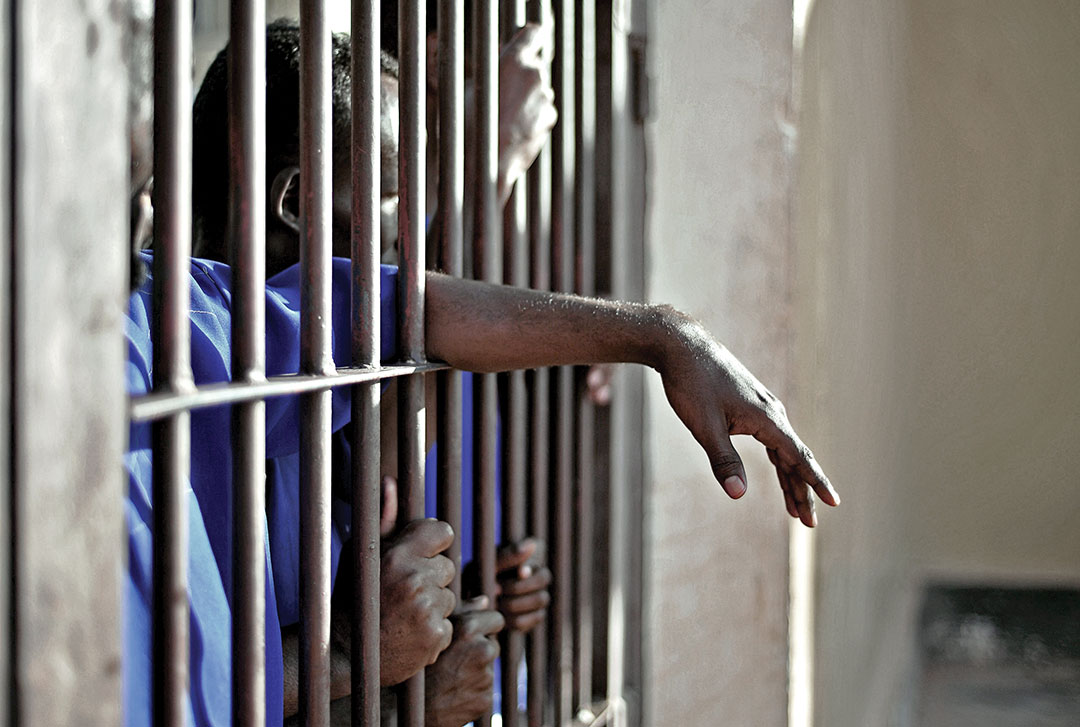Complex Laws and Limited Resources Make it Hard to Bring Criminals to Justice
ADF STAFF
The guilty verdict handed down in a São Tomé and Príncipe courtroom echoed across the globe.
A Chilean captain and two Spanish crew members of the notorious fishing vessel the Thunder were sentenced to two to three years in prison and fined a total of $15 million.
For the tiny Gulf of Guinea island that relies heavily on the sea economy, it felt like a rare win in a losing battle against illegal fishing.
“This isn’t just a victory for our country,” said Frederique Samba Viegas D’Abreu, the attorney general of São Tomé and Príncipe in 2015. “It’s a victory for the oceans and against these international crime syndicates that have operated for too long above the law.”

The odyssey of the Thunder illustrates just how hard it is to bring maritime criminals to justice. The ship fished for years across the globe, gliding from Antarctica to the West African coast. It flew a Nigerian flag but was owned by a Spanish investor and operated through a shell company in Panama. It had changed hands many times over the years.
It was stopped after Interpol put out a worldwide alert and due to the persistence of an environmental activist vessel, the Sea Shepherd, which chased it for 10,000 miles. When the Thunder’s crew intentionally scuttled it off the coast of São Tomé, activists boarded the boat to collect and preserve evidence.
Still, the court conviction was based on what prosecutors could prove. The charges had to do with forged documents, recklessness and pollution, not illegal fishing. The punishment didn’t fit the crime, and the crime was profitable for a long time. Interpol estimates that, as of 2013, the Thunder had made $60 million by illegally fishing for toothfish.
Allistair McDonnell, a criminal intelligence officer at Interpol’s fisheries unit, said global enforcement officials are scrambling to use the law in any way they can to stop criminal vessels.
“We are cutting away at the model,” McDonnell told Reuters. “We’ll attack the insurance, the availability of supplies and crew, attack the landing ports and the markets they use. It is death by a thousand cuts.”
The Thunder shows that justice at sea is rarely straightforward. Catching criminals in the vast ocean is difficult, but convicting them in a courtroom can be even harder. Crimes such as piracy, illegal fishing, oil bunkering, dumping waste and trafficking at sea have become widespread, but perpetrators rarely go to prison. A patchwork of jurisdictions, complex and outdated laws, and a lack of law enforcement capacity make maritime justice among the most elusive in the world.
Here’s an overview of the legal challenges posed in fighting maritime crime and what is being done to fight back.
Sea Boundaries
Figuring out who should prosecute a crime at sea is never simple. A country’s territorial waters extend 12 nautical miles from the coast. In this zone, the same laws apply as on land, but maritime boundaries between countries are sometimes ill-defined or contested. Beyond the territorial waters is the exclusive economic zone (EEZ), where the country has the right to extract natural resources and can set rules such as limits on fishing catches. This extends for 200 nautical miles from the coastline. About 42 percent of the world’s oceans are within an EEZ.

Beyond the EEZ lies the high seas. Although the United Nations Convention on the Law of the Seas protects the high seas, the reality is there is little enforcement capability there, and no country or institution has the primary duty to enforce laws. The Global Ocean Commission called the web of agencies, groups and nations that govern the high seas a “coordinated catastrophe.”
Criminals exploit these gaps and operate in areas with the least enforcement.
“Few places on the planet are as lawless as the high seas,” wrote Ian Urbina in The New York Times, in a series documenting crime at sea. “Though the global economy is ever more dependent on a fleet of more than four million fishing and small cargo vessels and 100,000 large merchant ships that haul about 90 percent of the world’s goods, today’s maritime laws have hardly more teeth than they did centuries ago.”
Prosecution at sea is further complicated by the international nature of the shipping industry. Boats are flagged in one country with crew members typically from several countries. Since the “flag state” of a ship has the exclusive jurisdiction to regulate the ship’s actions on the high seas, when that state is unwilling or unable to control its ships, there is no enforcement. This is called the “flag-state loophole.”
“When governments are doing so much to make their borders and their citizens secure, it seems extraordinary that they’ve left a loophole big enough to sail a trawler full of explosives through,” said former Costa Rican President José María Figueres, co-chair of the Global Ocean Commission.
Lack of Laws
In some cases the laws themselves are inadequate. This is particularly true with piracy, which was extremely rare until just over a decade ago. As a result, many nations have outdated piracy laws or none at all.
Justice Anthony Fernando of the Seychelles said that as recently as 2010 his country’s laws had only vague references to piracy and no definition of what constituted the crime.
After the first act of piracy recorded in modern Seychellois history in 2009, the country set about updating its laws. It adopted a detailed description of the offense and made it punishable by up to 30 years in prison and a fine of nearly $75,000. It also included language stating that pirates who commit crimes outside Seychellois waters can be tried on the islands.
Since then, the tiny country has led the region by trying more than 150 pirates.
“In certain countries there aren’t sufficient provisions or laws that deal with piracy,” Fernando said at a conference held by the Africa Center for Strategic Studies. “Just because it exists in international law, you cannot bring it into your own land in a dualist system and enforce it. It has to be granted to the courts by statutes. You cannot directly apply international law.”

Fernando said countries must adopt local statutes to fit their needs, and numerous African countries, including Nigeria, are modernizing their anti-piracy laws. Regional efforts such as the Yaoundé Code of Conduct, signed by more than 20 West African countries in 2013, outline maritime crime and call for countries to strengthen national laws and harmonize them across the region.
Another nettlesome issue is so-called articles of crime laws. Since it is difficult to catch pirates in the act of committing a crime, these laws state that suspected pirates found with incriminating items such as weapons, explosives, grappling hooks or chains can be charged as criminals.
A related question is bringing charges against seafarers operating a mother vessel when pirates are attacking ships from skiffs.
“Articles of crime legislation is very important in the Gulf of Guinea because it will shift the burden of proof,” said Dr. Kamal-Deen Ali, executive director of the Centre for Maritime Law and Security Africa in Ghana. “Where you are found, for example, with a speedboat loaded with AK-47s off the coast of Ghana or off the coast of Nigeria, the presumption is that you are going to commit piracy unless you can prove otherwise.”
Collecting Evidence
When members of a navy or coast guard board a vessel suspected of illegal activity, they are entering a crime scene. Like police in a big city, it often is their duty to collect and preserve evidence so that it can be used in court.
However, this skill set is not emphasized in many training programs. When Sailors aren’t prepared to handle a crime scene, it can lead to lost evidence and missed convictions.
“Naval forces may embark on an operation and arrest a vessel, and you realize at the end of the day that some of the critical evidence was lost or not handled well,” Kamal-Deen said. “It is essential that a crime scene should be protected so that a criminal investigation can be connected, especially so you can collect samples, and those samples can clearly link pirates or the suspects to the crime.”
The skills necessary to gather evidence on board a vessel are cordoning off a scene, preserving forensic evidence, taking photos or video, reviewing logbooks or electronic devices, collecting samples of suspected illicit material in the cargo hold, and recording statements from crew members.
“These factors are very important when it comes to prosecution,” Kamal-Deen said.
Members of national navies rightly say that such law enforcement actions are not their primary role, but the duty falls to them when they intercept vessels far from land and it is impossible for other authorities to access the scene. When possible, navy and coast guard vessels conduct joint patrols with other agencies or carry members of the fisheries service or maritime police on board to lead such investigations.
Efforts are underway to improve this capacity. A program called FishFORCE is a collaboration between Nelson Mandela University and the government of Norway to train fisheries control officers, police and prosecutors across southern and East Africa to convict people fishing illegally. One of the collaborations will be to start an academy in Kenya, where fisheries crime costs the country nearly $100 million per year.
“For crime to be combated, we need trained officers who can collect, preserve and present in court evidence for someone to be prosecuted,” said Professor Musili Wambua, who teaches at the University of Nairobi and has worked to set up the FishFORCE academy.
Another long-standing project is the African Maritime Law Enforcement Partnership (AMLEP) by U.S. Africa Command. It helps nations evaluate their legal framework and conducts joint patrols for training on how to board vessels, check paperwork, and, when necessary, arrest maritime criminals. During the operational phase of AMLEP in 2018, Cape Verdean, Senegalese and U.S. forces conducted 40 boardings, mostly of fishing vessels, and issued fines totaling $75,000.
Such efforts are showing that improving law and order on the seas can be achieved through international partnerships and capacity building. It also requires strong cooperation among the military, national and local maritime agencies, and the judicial sector.
“Well-networked actors threatening the security of African waters are growing at an alarming rate,” wrote Francois Vreÿ, research coordinator at the Security Institute for Governance and Leadership in Africa at Stellenbosch University. “African countries could address this by, in the first instance, ensuring that their national laws are aligned with the United Nations’ treaty aimed at ocean safety. Secondly, they need to start working together. It’s clear that single countries can do very little on their own. They need to sign up to multilateral initiatives. A growing network of collective maritime security is key to harnessing the Blue Economy.”
The Path to Prosecution
Getting a guilty verdict in a maritime crime case requires navigating an array of complex laws, preserving evidence and finding the right jurisdiction in which to try the case.
ADF STAFF
Evidence
Maritime security professionals boarding a vessel must treat it as a crime scene. This means collecting evidence, taking witness statements and inspecting the cargo hold for illicit goods. Since the ship and its crew may depart after the boarding, this initial period of evidence collection is crucial.
Charge
Charges brought against maritime criminals will be based on laws where the crime took place. Countries that have updated their laws to match emerging threats have the best chance of securing a conviction. For instance, a country with outdated or vague anti-piracy laws may find it difficult to prosecute a suspected pirate arrested in its waters.
Jurisdiction
The decision on which country’s courts should hold the trial is based on a number of factors, including the location of the crime, the nationality of the offender and the flag state of the vessel. This is complicated by the fact that illegal vessels typically commit crimes in multiple locations. Maritime borders such as the one separating a country’s exclusive economic zone from the high seas change the applicable law.
Detention
In many cases, suspected criminals must be held in detention facilities while awaiting trial. Humane detention conditions are essential for the integrity of the case and are required by international law. When foreign suspects are held, detention can be complicated by diplomatic pressure from the offender’s home country, which may demand an extradition or release. When crime occurs in one country’s waters but it lacks the capacity to hold the offender, a second country sometimes will volunteer to hold him. Kenya and the Seychelles have agreed to detain Somali pirates in certain cases.
Trial
Maritime trials can involve special legal knowledge and capabilities. Some countries, including Kenya, have set up courts to deal specifically with piracy.


Comments are closed.